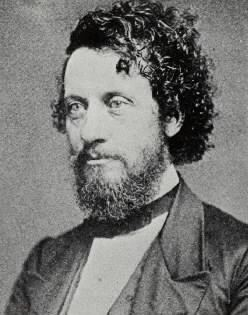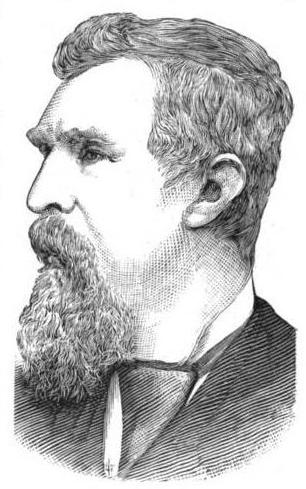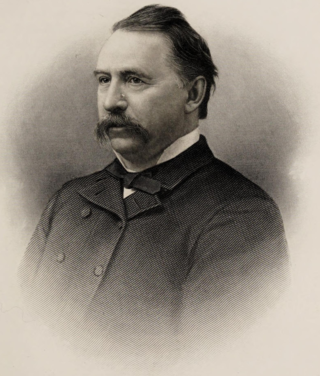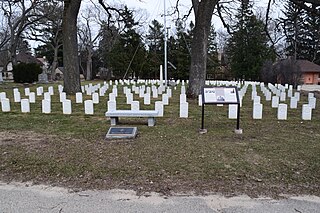Related Research Articles

Arthur MacArthur Sr. was a Scottish-American immigrant, lawyer, and judge. He was the fourth Governor of Wisconsin and was an associate justice of the Supreme Court of the District of Columbia. He was the father of General Arthur MacArthur Jr., and paternal grandfather of General Douglas MacArthur. MacArthur is the modern spelling used by his descendants, but in documents from his own time his name was spelled McArthur.

Coles Bashford was an American lawyer and politician who became the fifth governor of Wisconsin, and one of the founders of the U.S. Republican Party. His one term as governor ended in a bribery scandal that ended in him fleeing Wisconsin, but he was later instrumental in the government of the newly formed Arizona Territory.

John Coit Spooner was a politician and lawyer from Wisconsin. He served in the United States Senate from 1885 to 1891 and from 1897 to 1907. A Republican, by the 1890s, he was one of the "Big Four" key Republicans who largely controlled the major decisions of the Senate, along with Orville H. Platt of Connecticut, William B. Allison of Iowa, and Nelson W. Aldrich of Rhode Island.

Henry Smith was a millwright, architect, builder and politician who was elected a member of the United States House of Representatives from Wisconsin from 1887 - 1889 as a member of the Union Labor Party. He also served as a Socialist member of the Wisconsin State Assembly in 1878. At different times, Smith ran for office on the Socialist, Greenback, Democratic and Union Labor tickets.

David Atwood was a nineteenth-century American politician, publisher, editor and printer from Wisconsin. He represented Wisconsin's 2nd Congressional District in the United States House of Representatives during the 2nd and 3rd sessions of the 41st Congress.

Thomas Richard Hudd was an American lawyer from Wisconsin who represented that state for two terms in the United States House of Representatives, as well as serving in both houses of that state's legislature and holding other public offices.

John Winans was an American lawyer and politician in Janesville, Wisconsin. He served one term in the United States House of Representatives from Wisconsin's 1st congressional district, and served six years in the Wisconsin State Assembly representing Janesville and central Rock County. He also held several local offices, including two terms as Mayor of Janesville.

Forest Hill Cemetery is located in Madison, Wisconsin, and was one of the first U.S. National Cemeteries established in Wisconsin.

Harlow South Orton was an American lawyer and judge. He was the 8th Chief Justice of the Wisconsin Supreme Court, and served on the court from 1878 until his death. He is chiefly remembered as the author of the Wisconsin Supreme Court opinion Vosburg v. Putney (1890), an important torts case in establishing the scope of liability from battery. Earlier in his career, he served three non-consecutive terms in the Wisconsin State Assembly, representing Madison and central Dane County.

The 1866–67 United States Senate elections were held on various dates in various states. As these U.S. Senate elections were prior to the ratification of the Seventeenth Amendment in 1913, senators were chosen by state legislatures. Senators were elected over a wide range of time throughout 1866 and 1867, and a seat may have been filled months late or remained vacant due to legislative deadlock. In these elections, terms were up for the senators in Class 3.
Robert McKee Bashford was an American lawyer and politician who served as the 25th Mayor of Madison, Wisconsin, and represented Dane County in the Wisconsin State Senate from 1893 to 1897. He also served briefly as a justice of the Wisconsin Supreme Court in 1908, after the death of Chief Justice John B. Cassoday.

Robert Bland Sanderson was an American businessman, farmer, rancher and politician from Columbia County, Wisconsin who represented part or all of Columbia County in the Wisconsin State Assembly and the Wisconsin State Senate at various times in the 1860s, before moving to Texas and becoming a prominent businessman in Tom Green County.
The Reform Party, also called Liberal Reform Party or People's Reform Party, was a short-lived coalition of Democrats, reform and Liberal Republicans, anti-temperance forces, and Grangers formed in 1873 in the U.S. state of Wisconsin, which secured the election for two years of William Robert Taylor as Governor of Wisconsin, as well as electing a number of state legislators.
George R. Vincent was an American physician from Tomah, Wisconsin, who spent one term as a Greenbacker member of the Wisconsin State Assembly from Monroe County.
Michael Johnson was an American farmer from Springdale, Wisconsin, who served as a member of the Wisconsin State Assembly from Dane County, as well as holding various local offices.
William H. Hull was an American lawyer, Democratic politician, and Wisconsin pioneer. He was the 9th speaker of the Wisconsin State Assembly (1856) and represented Grant County.
Samuel J. Todd was an American lawyer and Republican politician. He was an early settler of Beloit, Wisconsin, and was the 4th Mayor of Beloit. He also represented Rock County in the Wisconsin State Senate for the 1867 and 1868 sessions. His name is often abbreviated as S. J. Todd in historical documents.
John T. Lyle Jr. was an American farmer from Montrose, Wisconsin, who served as a member of the Wisconsin State Assembly and as chairman of his town.

The 1857 Wisconsin gubernatorial election was held on November 3, 1857. Republican Party candidate Alexander Randall narrowly prevailed, defeating Democratic candidate James B. Cross by a margin of just 454 votes.
References
- 1 2 3 "The Death of Hon. B. F. Hopkins—What Is Said by the Press Elsewhere". Wisconsin State Journal. January 4, 1870. p. 1. Retrieved August 24, 2019– via Newspapers.com.

- 1 2 3 4 5 "The Late B. F. Hopkins". Wisconsin State Journal. January 10, 1870. p. 2. Retrieved August 25, 2019– via Newspapers.com.

